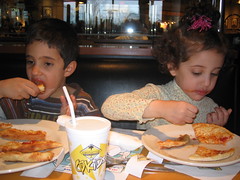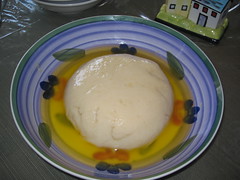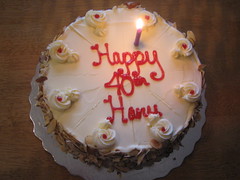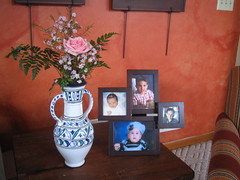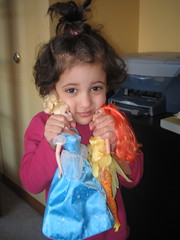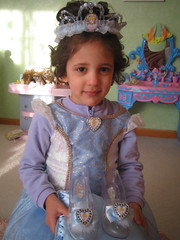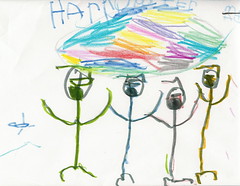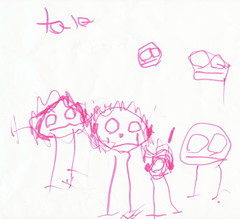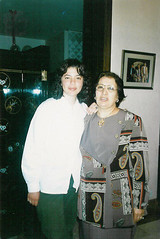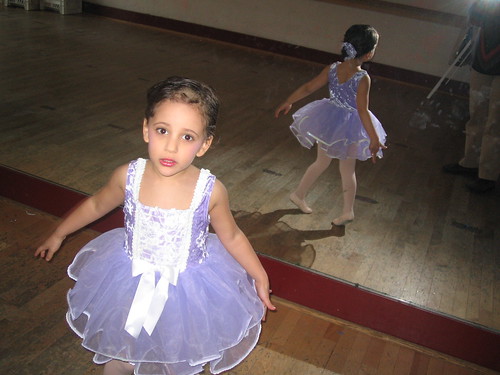In a
comment on a previous post, our friend Aisha (the Misratiya) asked what the name "Tala" meant and whether it was Arabic. So I started to put this post together back then, and finally it is done! So here is the story of Tala's name to Aisha and all.
By the time Tala was born, my mother had passed away, and there was some expectation perhaps that we would name the baby after grandma. Perhaps the expectation was stronger because of my special love and care for my mother, and because it would have been the last (planned) chance to name a grand daughter after her. But when she was here for Ahmed, we talked about the subject and she made it clear that she really didn't want to put any pressure on me one way or the other. For my part, I think the gesture of honoring someone is out of place or misdirected if the honoree is not there to receive it. I also had "gotten my way" with naming Ahmed, which is a story in itself for another day. So, I was completely open minded about naming the second child and Hana and I picked it together from a name book, believe it or not! We both liked it, and in Arabic it happens to mean the same thing as the Libyan Wishka (young palm tree), which is very special to any Misrati.
When each kid was born, I got Hana something with the birthstone to commemorate the occasion. For Tala, the birthstone is Peridot, which is an appropriate color for a palm tree! And in Tala's case, I also found an interesting piece that relates to her name in a special way.
Tala's name in Arabic (تالة) has a lot of symmetry: It starts and ends with the same double-dotted letter, but the left one, called the "Ta" of femininity in grammar, looks and (informally) sounds quite different from the first "Ta". Visually, the name also has mirror symmetry. Now, with some calligraphic imagination, you might see how the pendant in the picture can be viewed as a rendition of the word (تالة), sort of transposed, with the gem representing both the first and the last letters, the four clamps representing the dots, and the upward arms representing the Alif (left) and Lam (right).
Shortly after Tala's birth, it occurred to me that the word seemed so simple and fluid that it porbably existed in other languages. Thanks to Google, I compiled a collection of the meanings of Tala in various languages, which is listed below.
In Libya
* Arabic: Tala (تالة) Synonym: Faseela (فسيلة) In the Libyan dialect: Wishka (وشكة)
A young palm tree, usually an offshoot growing next to a larger mother. Similar woman's name in Latin-based languages is Palmetta. But Tala in Arabic can be used on any kind of tree that is transplanted, as opposed to a tree/plant started from a seed.
* Berber: Tala (in Arabic letters تالا ) means Spring or Fountain.
Famous Person: Nana Tala, i.e., Grandmother Tala, a pious woman buried outside the city of Jadou, I believe.
Oddly enough, according to Libyan law today, it is illegal to name children with non-Arabic names, especially Berber names, even though the official government line is that the "Berbers are ancient Arabs." So, they're ancient Arabs, but their names are illegal because they are non-Arabic, OK? Go figure! This makes the name Tala uniquely qualified for the ultimate naming conondrum for Libyan official record keepers! She has no official record of birth in any language but English, which means her birth name is "Tala." If we were to register her in Libya, we would have to decide on whether to spell her name as (تالة)، which would be perfectly legal, or (تالا), which is different by one letter, and is strictly illegal as it would be explicitly non-Arabic! The only thing approaching a commitment on our side is probably the pendant in the picture above, but still, the possibilities are certainly worth contemplating to understand something about the reality of life under a totalitarian dictatorship. Can any law be more asanine than that?
* Places Named Tala: Across North Africa there are a bunch of different villages/towns named Tala, often with a spring and of course palms. In Libya there is a village in the central region, near Hoon/Waddan area.
In India
Tala: A music term meaning rhythm or beat. Also means palm tree, interestingly enough, as in the name of a palm forest Talavana, or just tree as in Imli Tala (Tamarind Tree), and apparently Tala can also mean shade.
In Thailand: Tala means Green.
In Samoa: Tala is the name of the currency, some say a modified version of Dollar.
In Persian: Some sources say Tala means "gold," but I found out the persian word is really written as طلا not تالة or تالا, so this one counts coincidentally: the words happen to look the same in Roman characters, but the originals sound quite different.
In Filipino/Tagalog: Tala means star, or bright star, or morning star, which is also used for Venus.
In Estonia: Tala means Beam.
In Mongolia: Tala means Land. (As in Bayan Tala = Fertile Land).
In Greece: Tala means to bear, support or hold up.
In Native American: A female hunting wolf.
In Burma: It means Owner and a title like King. [oddly enough, there is a closeness of the Arabic words Mellik (ملك) = King, and Malik (مالك) = Owner.]
To us... Tala means all that and some! A palm, a cool fountain spring, a beam of bright morning starlight... simply heavenly, and that's how she evokes memories of her grandmother.


